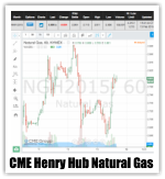|
As a business owner you should ask your self these two questions:
Does the cost of NG affect my business bottom line? The answer to this question is not a simple "Yes or No", if your business is currently under an energy supply contract and it does not expire within the next 12 to 24 moths, then the current cost of NG would not affect your bottom line, depending on the type of business you run, of course. However, if you are looking to shop for an energy supply contract within the next 12 to 24 months, then the answer is a definite big fat "YES", the current cost of NG will affect your business bottom line. How is that possible? Well, the energy supply contracts are backed by many variables, Natural Gas being one of the main ones. How can my business benefit from it? I would love to say use a USEC Broker to negotiate your next Energy Supply Contract, but that would be unfair to the competition :). Our advice is for your business to take advantage of the dips in the NG market, when the market dips as it currently has, lock in to the longest term you could possibly negotiate with a supplier. Texas Business Owners, please pay very close attention.Product Offered - If your Broker is not currently (I do mean currently) advising your business to get in to a "Fixed Price" product, FIRE THEM IMMEDIATELY. There is no good logical reason for a business to go in to an "Index Price" product with the market conditions being what they are today. For example, in the last 4-6 months USEC participated in negotiating and securing Energy Supply Contracts for both C&I (Large Commercial & Industrial) and SMB (Small Business) customers, with the offered Fixed Price product for 60 month Term being in the low 3's and 4's depending on their size and load factor. Again, do not let a Broker or a Consultant to insult your intelligence, if they are pushing you in to an Index Price product with a $.03 cent adder, do not hesitate and kick them out of your business. There is no good logical reason for your business to be on an Index product with a $.03 cent adder when you can lock your business in-to $.03 Fixed All-in product. Term Offered - if your current Broker is only bringing short terms to the table, such as 12 - 24 months, FIRE THEM IMMEDIATELY. With the historically low NG prices, your business should consider the longest Fixed Price Term possible, I do mean 5 years or longer. Imagine if you could go back 5 years and lock your business in to a Fixed All-in product at $.035 would you do it? Of course you would, today is no different. Complex Customers...There are many products available in the current Deregulated Energy markets, not every product is a fits all. Here at USEC we have seen everything from a Fixed All-in to Heat to Portfolio products, business owners who are educated by their brokers can make the right decision for the business. The only way to truly know if you are in good hands is to get a second opinion from time to time. "With today's NG market conditions, there is no good logical reason for a customer to lock in to a short term contract, unless they have a crappy Broker." by: Mikhail Skachko
0 Comments
When Comparing Apples-to-Apples, are You really doing so?When I first got into Deregulated Energy Industry I worked in a Business-2-Business (B2B) sales, we offered one Supplier, one Product, one Price fits all. Today I can still recall being upset that the price I was offering was easily beaten by our competitors the "Broker". Now 15 years later I'm on the other side of the fence, with a portfolio of over 40 suppliers, multitude of Product options and some of the best pricing in the industry. Sometimes our company goes up against other Broker Shops in a competitive bid situation and at times we do run into B2B Customer Acquisition Companies, that is when it gets interesting. When we go up against other Broker Shops the difference in a price is measured by a fraction of a penny. It is a totally different story if we run into B2B sales reps, when that happens the price difference baffles me, in favor of the B2B rep that is. How is it possible? (you ask)
The answer is simple; We are no longer comparing Apples to Apples and at times not even Apples to Oranges. Looking back at the road that our Energy Brokerage shop has traveled, I can't help but smile. The cool thing is that we have grown our business from a one man shop to a nation-wide organization, but that story is for my book not this post. "If you own a business you would agree with me that cutting cost is one of the easiest ways to raise the profit margin."
Deregulation of Energy allows businesses who operate 24/7 or in 3 shifts to take advantage of products that other wise would not be financially feasible.
"Well what do you mean by that Mikhail?" I thought you would never ask, (like how I'm having a conversation with my self?) there are variety of products available to businesses, they are as follow: Business owners and consumers be on alert for Fake Utility Bill Collectors. We have had two of our customers contacted by so called Utility Bill Collectors just to find out it was a SCAM. If you have made a payment on your Utility invoices and still got a call from the Utility Collections department be on high alert. See video for more details.
A smart meter is usually an electronic device that records consumption of electricity or natural gas in intervals of an hour or less and communicates that information at least daily back to the utility for monitoring and billing purposes. Smart meters enable two-way communication between the meter and the central system. Unlike home energy monitors, smart meters can gather data for remote reporting. Such an advanced metering infrastructure (AMI) differs from traditional automatic meter reading (AMR) in that it enables two-way communications with the meter.
Smart meters, also called advanced digital meters, are the equivalent of a home’s electricity nerve center, connecting it to the Smart Grid and enabling consumers to have better control over their usage and spending. |
Mikhail Skachko"Customer is always right, even if they are wrong." Archives
February 2016
Categories |
Some of our Clients
"After taking a chance on a USEC Broker, we are happy to have consistent savings in the last 4 years over ComEd. With USEC knowledge and experience, they were able to provide us with multiple options and steer us in the right direction to cutting cost. Everything has been A+ so far."
- Chicagoland Restaurant -
- Chicagoland Restaurant -
|
U.S.E.C. LLC
d/b/a US Energy Consultants 13215 Stafford Rd, Suite #500 Missouri City, TX 77489 713-772-0446 office 888-764-3888 fax |



















